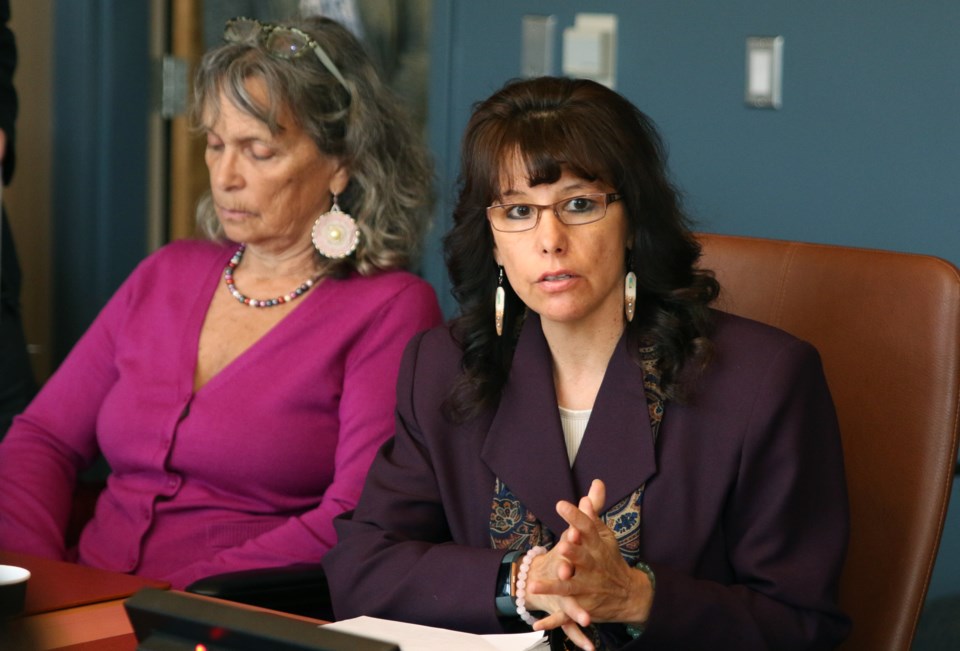THUNDER BAY – Lakehead University is being sued by its former law dean, who alleges she faced workplace hostility from faculty members and staff that was ignored by the school’s leadership, which also subjected her to ongoing micromanagement throughout her tenure.
Angelique EagleWoman, who the school hired as the first Indigenous woman to lead a faculty of law in Canada until her abrupt departure earlier this year, has filed a statement of claim with the Ontario Superior Court of Justice against Lakehead.
The claim, filed in Ottawa last week, seeks a total of more than $2.6 million on the basis of constructive dismissal and breaching a section of the Ontario Human Rights Code.
“The (university’s) ongoing micromanagement, failure to provide (EagleWoman) with the tools, resources and support needed to succeed in her role, and failure to address the hostile work environment ultimately led to the complete deterioration of the working relationship,” the claim alleges.
EagleWoman, who had been living in Pullman, Wash., had been hired by the university in December 2015 with her employment to begin on May 1, 2016 and continue for five years through the end of June 2021.
At the start of her tenure, EagleWoman alleges she had been asked to report all interactions, communications and emails with faculty members to then-vice president Moira McPherson, who has since been named the university’s president.
According to the claim, the university placed a consultant into the chain of command between EagleWoman and university administration, which EagleWoman said discredited her leadership style and devalued her years of experience and status as “a pathbreaking Indigenous legal scholar.”
The legal filing also claims that the university transferred an employee into a role where he was asked to report on EagleWoman’s job performance to McPherson.
“The (university’s) micromanaging, regular monitoring and constant oversight reflected a paternalistic and even colonial attitude towards (EagleWoman) and conveyed the message to her and others that perhaps she was hired for reasons other than her abilities, experience and reputation as a scholar and academic leader,” the claim alleges.
“Making decisions without consulting (EagleWoman) was not only professionally disrespectful, it was culturally insensitive to an Indigenous person whose cultural practices valued and attached significance to dialogue and consensual decision-making. This treatment harmed (EagleWoman’s) dignity as an Indigenous person and an individual who was highly regarded and respected in the academic world.”
EagleWoman also claims that the university underfunded the law school, with only 65 per cent of its generated revenue allocated into its approved budget.
The statement of claim alleges that despite her contract not forcing her to teach, EagleWoman was required to teach courses every semester except for her first in the fall of 2016 as a result of a shortage of permanent faculty members.
“This increased workload impact (EagleWoman’s) health and well-being and made it more difficult for (EagleWoman) to carry out her decanal responsibilities,” the claim reads.
Lakehead University acknowledged the lawsuit, but did not offer comment other than a short statement.
"We have received a statement of claim from Angelique EagleWoman’s lawyer. Lakehead University does not comment on any litigation or personnel matters," the unsigned statement said via email.
The statement of claim notes that two former staff members had made allegations of discrimination against EagleWoman on the basis that she prioritized attracting Indigenous faculty, staff and students, though it accuses the university of not meaningfully consulting with EagleWoman or taking any active steps to countering resentment or hostile attitudes towards her appointment as dean. It also alleges university leadership did not step in to address tensions and hostility directed against EagleWoman by two faculty members.
EagleWoman, who in 2017 became aware that she had been paid less than her non-Indigenous male predecessor, accused the university of taking advantage of her profile by claiming it demonstrated the school’s purported commitment to Indigenous law and Indigenous communities.
“(Lakehead) benefitted from the publicity surrounding (EagleWoman’s) appointment through national exposure, heightened credibility with Aboriginal communities and increased Aboriginal student enrolment,” the claim reads.
“But (Lakehead) never gave (EagleWoman) the authority or respect that her position as dean entailed, and failed to address the discriminatory work environment through cultural competency training or other proactive measures.”
EagleWoman announced her resignation earlier this year, leaving the post on April 30.
The allegations contained within the statement of claim have yet to be tested in court.
